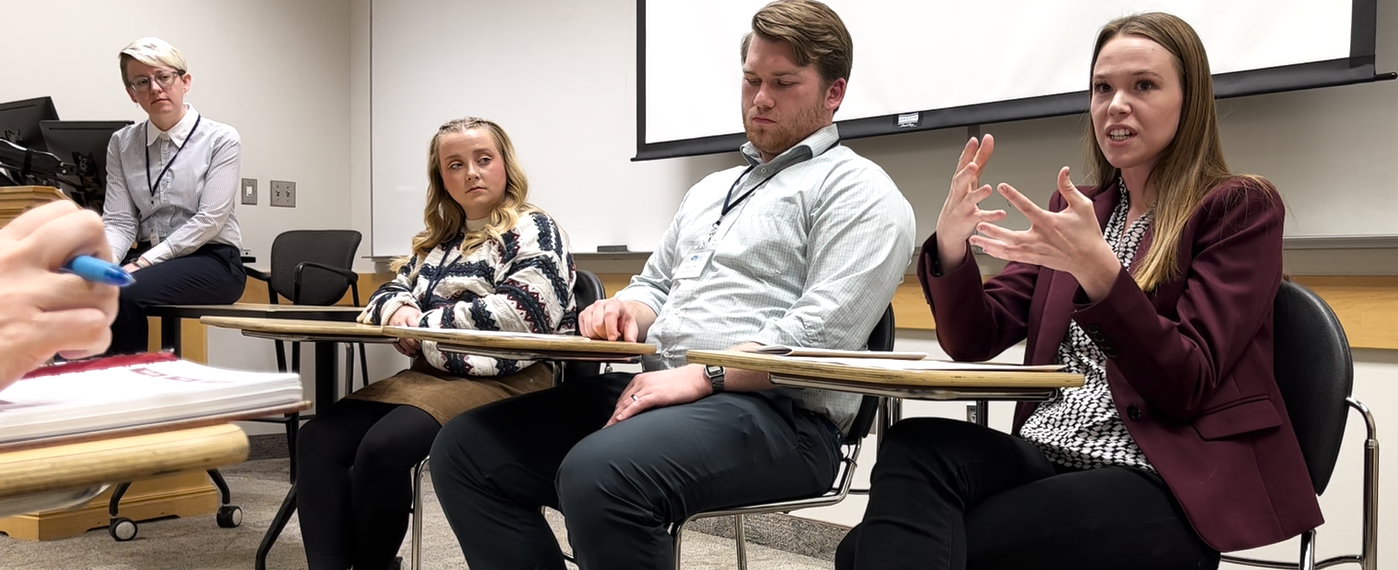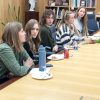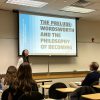What is English Symposium?
Symposium (noun) sym·po·sium
1a: a formal meeting at which several specialists deliver short addresses on a topic or on related topics
1b: a social gathering at which there is free interchange of ideas
Did you ever finish an English class, turn in your final project, and then think, “Dang. That paper (or presentation, or unit plan, or creative piece, or whatever) is really good. Too bad the only person who will ever see it is my professor”?
English Symposium exists, in large part, to reverse this tragedy by giving English majors and minors an opportunity to showcase their work. It’s a chance for you to continue the conversations you began in class and to expand your work beyond the classroom. Most of all, it’s a moment for everyone in the English community at BYU to celebrate our common interests as readers, writers, and lovers of all things textual.
In sum, the English Symposium provides us with an opportunity to gather around a common subject matter—English–in order to teach one another, learn from one another, showcase student work, build professional skills, encourage networking, promote intellectual growth, and strengthen our community.
Most of all, English Symposium is a moment for everyone in the English community at BYU to celebrate our common interests as readers, writers, and lovers of all things textual.
English Symposium is set up like an academic conference, but if you’ve never been to one of those, think farmer’s market, only with less kale, sourdough bread, or homemade bracelets. JFSB classrooms become the equivalent of market booths that host rotating panels of student presenters who share projects, essays, poems, and ENG+ experiences. English classes are cancelled for the two-day event to give students a chance to attend different panels, exploring this marketplace of ideas.
Each symposium panel is made up of 3 or 4 students who want to share their work, plus 1 faculty chairperson (who welcomes everyone and makes sure the panels start and stop on time). Student presenters convert a project or paper into an oral presentation of about 10-12 minutes and present it to whomever has stopped in to listen. When they finish, the next presenter presents, and when everyone on the panel has presented their work, we open the floor for questions, comments, and discussion.
Panels last about an hour, and you can choose which panels to attend by consulting the program that we’ll distribute ahead of time. We try to group presentations with similar themes or topics together, like a “Shakespeare” panel, or a “twentieth-century American lit” panel. Students can also get together with friends and classmates who have similarly-themed work to organize their own panels, and these are often the most interesting.
And that’s where you come in: students are what make the English Symposium interesting! The more students attending panels, the keynote lecture, and the English Fair (which gives out a bunch of swag, including the 2024 department t-shirts) the more successful the symposium, because student participation is the whole point. This, of course, starts with students being willing to present.

Why should you submit to the symposium?
Because it’s fun to share something you care about with others who share your interests. Because it’s rewarding to flex your intellectual muscles publicly and to see the skills of your peers. Because it’s a good line on a resume: “presented X paper in BYU’s annual English Department student Symposium.” Because excellent work shouldn’t go in a drawer at the end of the semester, nevermore to see the light of day.
But most of all, you should present at English Symposium because we value you and your ideas! You are what makes the English Department what it is. Your brain fuels every class, every internship, every workshop. Without you, we cease to exist. So we want to celebrate you and the hard work you do.
How do you get involved?

Academic Projects

Creative Writing

ENG+ Experiences
When you apply, you’ll need a 200-word description of your essay, project, or experience. Groups will need to give us a theme or title of your panel, along with info on the individual presenters. If you want to see samples from previous students, go to “Examples.”
Finally, English Symposium is linked to a bunch of writing contests around campus, so that submitters can potentially earn some cash! If you want to submit creative writing, you’ll need to do it through one of the creative writing contests. If you’re submitting academic work, read more about the contests your project might qualify for on the academic writing contests page. Then, when you submit your description, be sure to tell us which contest(s) you’d like to enter your paper/project in.
Submissions for 2026 will be open November 1, 2025 through January 14, 2026.

